Latest Contributions
A Journey Through Life-1
Category:
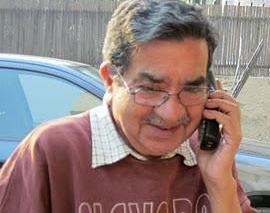
Jatinder Sethi was born in Lyallpur, now Faislabad, in pre-Independence India. He finished his M.A. (English) from Delhi University in 1956, and went off to London to study Advertising in 1958. He passed his Membership Exam of The Institute of Practitioners in Advertising (M.I.P.A) in1965, and joined Rallis India in Bombay. Later, for over 20 years, he worked for the advertising agency Ogilvy &\; Mather. Now retired, he helps his son in his ad agency in Delhi.
Editor’s note: This is the first part of a three-part story. The second part of the story is available here (under preparation), and the third part is available here Under preparation).
Preface
This is a story of a part of our journey through life. It is a journey of a couple, from student days through five decades of life together and work, and finally a retired life.
This part will only highlight the adventure of a young, newly married couple, who travelled with hardly any money in the pocket. And landing in London without knowing a soul in that foreign land. It is more a journey through life of two people, who fell in love, without realizing or knowing what the future will unfold. Or hold. Well, "Love is blind", and we were blind. But we will not do it again.

At home in Gurgaon 2014
What triggered this nostalgic outburst decades later? May be dead autumn Leaves.
Having retired long time back after working for almost 45 years in Bombay in companies like Rallis India and advertising agency, Ogilvy, Benson &\; Mather (OBM), now known as O&\;M, we settled down in Gurgaon, Haryana, India.
Our home adjoins the Delhi-Jaipur National Highway Number 8. And we are hardly few minutes' walk to a mini-golf course, Tennis Courts, and quite a few well-laid gardens that have an almost 2-km long jogging track running in the large wooded green belt. Since moving to this place, I have never missed my morning brisk walk in one of these gardens.
I picked up this walking habit long ago when I was living in a similar environment in 21 South Hill Park, N.W.3 Hampstead, London, just close to the Heath.
One morning in mid-May 2014, while walking into the park here at Gurgaon, I noticed that the whole ground was covered by a thick carpet of sunburnt autumn leaves! It must been around 5.45 am, and the sun was already up. The early morning sunrays were piercing through the overgrown hundreds of trees in the green belt, and giving a golden touch to the fallen leaves. Just like Autumn Leaves at the Heath. (Look at the photos of these leaves at our Gurgaon Park, and the Hampstead Heath)
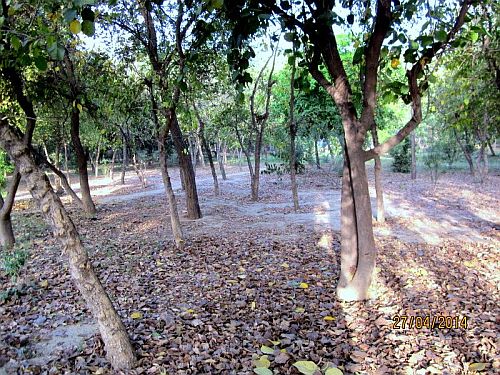
Leaves in Gurgaon
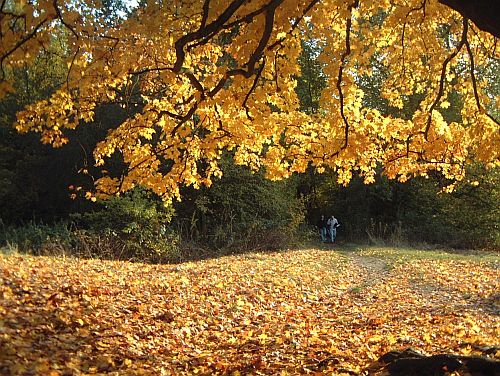
Leaves in Hampstead Heath
As I put my sneakered feet down, gingerly first and then little faster to hear the crackling sound of these so- called dead leaves. I do not know how to describe this sound that has a mesmerizing effect on you. I also do not know why, but since my days at Hampstead Heath, I have always associated the crackling sound of Autumn Leaves with the Shelly's "Ode to West Wind"
"Oh wild west wind Thou breath of Autumns being-Thou, from whose unseen presence the leaves dead are driven like ghost from the enchanter fleeing"
Although in England I lived hardly few minutes away from the House of John Keats, where he wrote Ode to a Nightingale, but it is Shelly I recall.
And this was the crackling sound of autumn leaves, this misty morning in Gurgaon Park that transported me back in time to the same sound of autumn leaves to the Hampstead Heath, London - in the winter month of November 1958. It was hardly a month after my wife and I had landed in London, on October 4, 1958.
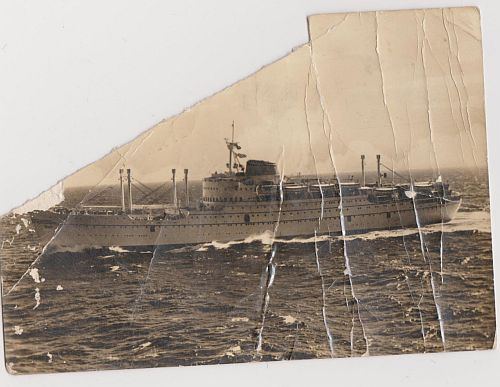
Picture post card (front and back) posted from Aden (500 miles) to my wife's parents after sailing from India September 1958.

The Journey Begins
Let's begin from the beginning - the story of an unsuitable boy!
My life partner, Uma, now my wife for 56 years, and I were both students in Delhi University in the 1950s. She was doing her Masters in Philosophy from Indraprastha College, and I was studying for Masters in English at Kirori Mal College. While attending classes at the University, we used to bump into each other at the Coffee House at the Campus. It was 1956/57. I am sure she wasn't even aware of me, but I lost my heart to her the very first time I saw her.
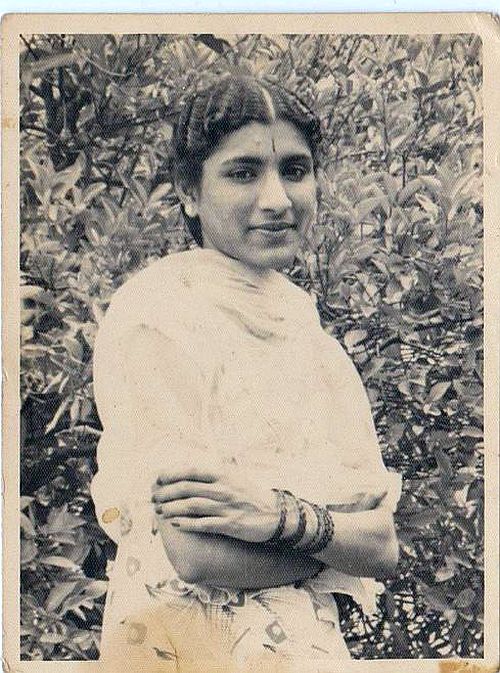
Uma, 1957
From that heart-thumping moment, I started finding ways to see her and meet her. She was quite a popular girl, and always in a group of friends. I eventually requested another friend of mine, Kamla Bhalla who was her classmate, to introduce her to me. This was our final year of college/university.
Surprise! She agreed to meet me! My friend brought her, one Sunday morning, to the United Milk Bar in Connaught Circus. The only place in those days that had a Juke Box. And after introducing us to each other, she walked out. My heart was beating, and I did not know what to say that now she was so close that I could feel her warmth. There was a moment of awkward silence, but hint of a smile in her eyes put me at ease.
Somehow, I managed to order milk shake. Looking at her beautiful eyes, thin lips and curly hair, I blurted out a sher (couplet) of Meer Taqi Meer, a renowned Urdu poet. (In those days, Urdu poetry was very popular among Dilliwallas and Delhi University students. The complete ghazal sung by Farida Khanum is available here.)
Nazuki uske lab ki kya kahiye
pankhudi gulab ki si hai
meer un neem baaz aa.nkho.n mein
saari masti sharaab ki si hai
Though it was only the first meeting, but being so close to her, I got so intoxicated by her presence, I felt I could not live without her. So, I told her, then and there, that I wanted to marry her! And I took her to my mother, and blurted out my wish and desire. Most encouraging sign to me was that she never raised any objection.
My mother was quite uneducated. She was almost illiterate, knowing only Gurumukhi in order to read her Jupjee Sahib. She could be expected to be conservative in her views, and in favour of arranged marriages. But, she had become quite liberal minded after migrating to India from Pakistan in 1947. After coming to India, she had already blessed three love marriages in the family. One of my older brothers, Nath Bhaji, an artist, brought his vivacious young girl friend, with her trunk, from the Miranda House Hostel, Delhi University. My mother got them married off before her parents, a Sikh family (with 12 children), could object or do anything.
(Unfortunately, Nath Baji passed away at a young age. I think it was the shock of the tragedy of her oldest son, at the top of his career at Lufthansa, became a victim of cancer, leaving his wife with two young daughters, who are now both studying in America. It's again a tribute to true love that both my bhabi (Nath Bhaji's young bride from Miranda House) and their late son's wife brought up great families that one is proud of. I was very close to this brother of mine, and miss him a lot. He was a true artist in life. My oldest son seems to have quite a few traits like him: love for green plants, flowers, birds and photography. They both were so involved with small business that the management of house and children was left to the wives. Same DNA.)
Next, my older sister, who had done her M.A. in Social Sciences from Delhi University, brought her classmate - a tall lanky looking young man in a white shirt, white trousers, and white shoes with a name like Sikander Malik to my mother. (His first name is Muslim, which shows that once upon a time, Hindus- Muslims were close to each other before the British divided the country.) And my sister told mother that they wanted to get married.
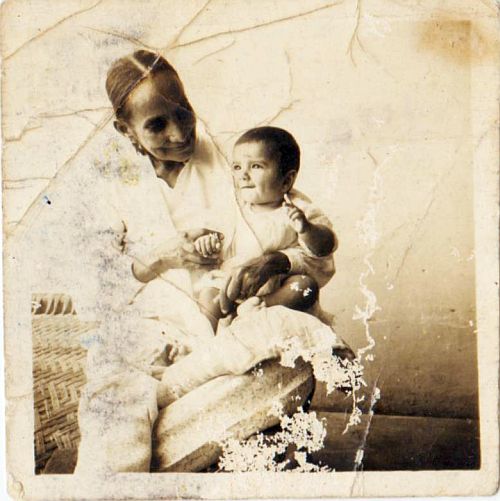
My frail mother, Beeji, (6 sons, 2 daughters) with one of her grandchildren. Early 1950s.
My mother had no hesitation. She blessed the young man, and got them married off. Weddings in our home were very simple. My mother would call a Panditji from the Arya Samaj. He would perform the Hawan, and all the rituals of taking seven pheras around the fire of Hawan Kund. Then, he would declare the couple as husband and wife.
Another brother of mine also had a similar love marriage. In fact, my mother became a refuge for her nephews and nieces, from upcountry small towns, who ran away with friends to get married. We all called her Bijee. She was always there to go out of her way to help and solve their entangled problems. Although she herself was quite frail and old, she never let it be shown or seek sympathy from others. My father was devastated when she died. Unlucky for me and my wife that we were in London when both of my parents passed away.
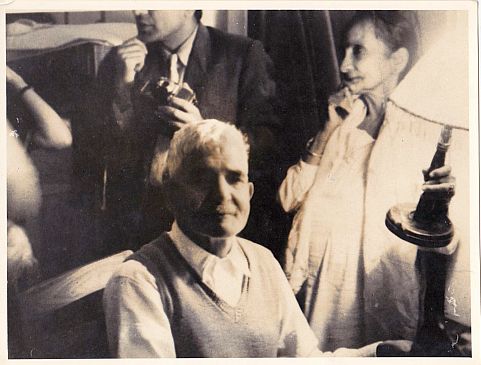
My father, Pitaji, my mother Beeji

My father, sister and bhabi at the death of my mother.
So my request about me wanting to marry my friend did not surprise Beeji at all. Moreover, I, being the youngest of six brothers and two sisters, was the Laadla (favourite) spoiled, good for nothing child.
I noticed that my mother liked my friend instantly - she had that magical look. My mother got Uma to sit next to her, kissed her, and blessed her as a daughter-in-law. And, Beeji asked her to visit her regularly. Still, my mother wanted to know how this girl had decided to become a friend to a nakema (useless) boy like me. We were refugees from Pakistan, and all my brothers and sisters were struggling to survive. My father, who was an advocate in Pakistan with a good practice, had become dependent on his earning sons.
I too was dependent on my brothers. I had no job, and used to spend most of my day in the India Coffee House, Connaught Place, with friends discussing poetry over cups of coffee. Like TS Eliot"I have measured out my life with coffee spoons." During all this time, however, our courtship continued with strengthened resolve to get married. I was jobless - that didn't seem to hit me.
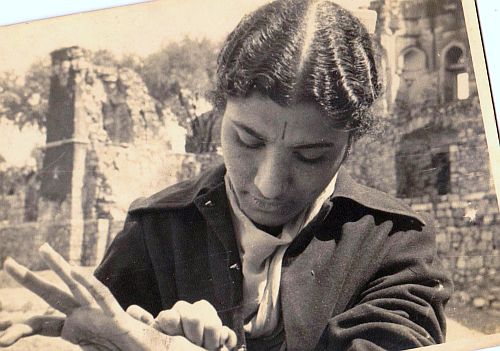
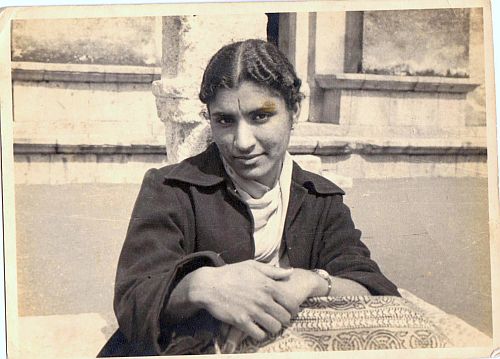
Uma, at Hauz Khas, New Delhi circa 1957
(These photos, taken sometime around 1957, in Hauz Khas, which used to be a beautiful,green, and exclusive, resort for lovers. In those days, it seemed miles and miles away from Delhi. We used to cycle through villages to reach Hauz Khas and, some time, far beyond to Kutab Minar! I feel a great nature's sanctury is lost to today's generation. It's all steel and concrete! Pity. Our house in Gurgaon is miles further away from this once exclusive place, which we pass by almost every day, without even giving it a fleeting glance.)
On the other hand, my friend, she, belonged to a very well-known rich and old family of Delhi! (Typical Hindi filmy scenario). Proof? Her father, after finishing his studies in Birmingham, came back to India in 1931. England Returned! That Big!
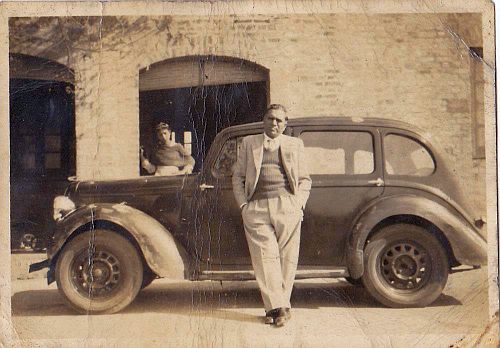
My father-in-law, S.N. Sikand, in front of his old model car, with his older daughter at the back.
And she herself used to work in All India Radio, as a casual drama artist and a singer. And yet she agreed to fall in love with, and marry, me.
Moreover, there was an almost generational gap between our families. Her grandfather was the age of my father. And her father was the age of my oldest brother.
The great chasm in the social status of two families did not bother both of us. And finally, her family graciously welcomed me in their circle. (Unfortunately, our album of wedding pictures, showing the Milni ceremony at the bride's home, has got lost).
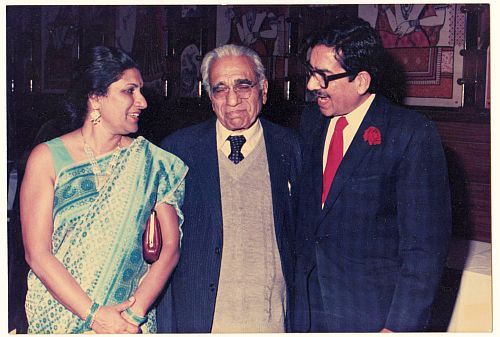
My father-in-law, S.N. Sikand, with us in later happy years. 1967
It's the Unsuitable Boy becoming lucky. And on February22, 1958 he got married to his love!

Just after our wedding, with Kamla (right), her friend who introduced her to me, 1958
Love Conquered - Now The Reality Strikes!
After my family happily agreed to us getting married, the hard reality struck us. I had to find a job, both in order to support ourselves, and to give a convincing reason to her parents to not reject the marriage proposition. I, therefore, decided to go to Bombay to look for a job. And stay with my sister, who was in Bombay, and her husband-the lanky boyfriend of her college days, Sikander.
After coming back from London School of Economics, Sikander was a senior executive in a British company. He was one new member of our family who never looked at the negative side of life. Always laughing, always positive about life. Very optimistic. A great moral support to the family. (Pity he died young, leaving my sister with three daughters to be brought up. My sister took up a teaching job in Delhi, and brought up these girls-all brilliant, Rhodes Scholars, PhDs from Cambridge. A great achievement by my sister. Shows what love can do. It was all for Sikander-the man she loved - in whites always.)
I landed up in their house in RP Masani Road, Matunga in September 1957. This road was known as the Hollywood lane\; Prithvi Raj Kapoor, K N Singh, K L Saigal and Manna Dey used live there. In those days, Matunga was the last suburb, with Salt Pans starting immediately after that.
After a frustrating few weeks of not finding any job, I happened to walk into the Mahindra &\; Mahindra's office, just behind Taj Hotel, Gateway of India. I was asked to see Mr. Suresh Mahindra, who was running an advertising agency - Press Syndicate. When I walked in to his office, I saw an Americanized Indian, but a familiar face. He turned out be my classmate, from year's back, from the Arya Samaj School in Lyallpur (now Faisalabad, Pakistan) I had attended. His parents, living in Lahore in those days, had sent him to Lyallpur, where my family lived.
He also recognized me, yet kept his reserve. After a small friendly chat, he offered me a job in his advertising agency, located on the third floor of Army Navy Building at M. G. Road, near Kala Ghoda. The monthly salary offered was Rs.250/-!
I accepted it without hesitation, and joined the agency the next day. On hearing this news, my family, in consultation with my friend, fixed up to meet my to-be-wife's parents. And I was asked to come to Delhi for this meeting to show my face as the future bridegroom. I reached Delhi two days before the fixed date agreed by her parents, uncles and grandparents.
I was not sure of her family's reaction, because of the difference in social status of our families. And, since her older sister was still unmarried, her parents could have asked her to wait until the older daughter got married. Realizing that we both were rather jittery and worried, my third oldest brother, Premji Maharaj, who was a follower of Swami Satyanand Ji Maharaj of Shree Ram Sherman, took both of us to meet Swamiji. (Later on Premji Maharaj became the head of Shree Ram Sherman after Swamiji passed away.)
Swamiji after smilingly listening to our silly story gave us the Naam, and blessed us, saying "Sub Theek Ho Jaiy Gaa (All will be well)". And so it did.
Her parents, after meeting all members of my family, agreed to marry their daughter to me. They were told that I had a job of Rs. 800 per month with Mahindras in Bombay! (A fat lie)
The only request they made was to set our wedding date after the wedding of her older sister. We agreed. Luckily, the older sister's wedding also got finalized few days after our meeting. And the dates were fixed. Her elder sister would get married on 20th February 1958. And our wedding was fixed for February 22, 1958, two days after the wedding of her older sister. I happily went back to Bombay to my job. I later on took leave from my office to go for my wedding.
As our wedding had been agreed to by both families, it was a regular Punjabi affair, arranged by the bride's parents at their home. Not the type my mother organized for eloped couples-Hawan and Pheras only. Although ours was a love marriage too, but it was with the blessings of both sides. My Baraat - the groom's wedding party - consisted of all our relatives, friends with full paraphernalia of brass band.
By this time, her older sister, now married, with her husband and their relatives were there to receive our wedding party. After the wedding ceremony, dinner and bida (departure), we left to come back to our place, at Nizamuddin East.
After finishing few other ceremonies in next couple of days, we - now husband and wife - left for Bombay by train. To re-join my office and monthly earning of Rs.250/!
How the hell we are going to manage?
Bombay-No place of our own to stay!
This reality of a newly married couple, with no place of their own to live reminded me of a song from an old Hindi film Gharaondaa:
do deewane shehar mein
Aab-o-dana dhoondhate hain
raat mein aur dopahar mein
Ek aashiyaanaa dhoondhate hain
But we ploughed on.
Initially, we moved into with my sister and her family, hoping to find a place of our own. But, both my sister and her husband, in fact, welcomed us with open arms, and genuine love. So we settled down with them, and I went back to my work at Army Navy Building. My sister, also a housewife got along famously with her new Bhabi. Though my sister still wondered what made this mad woman fall in love with her good-for-nothing brother. But she forgot that she herself had walked the same path-married to an unemployed man at time, who rose to be a Director of a British Company, in Hyderabad.
Time passed.
By now, my sister had two little daughters, who loved our company. There was no pressure from them for us to look for our own place. But we had the need of our own privacy, and hence a place of our own. It was almost impossible to get a room, forget an apartment with the kind of money I was earning-if it can be called earning.
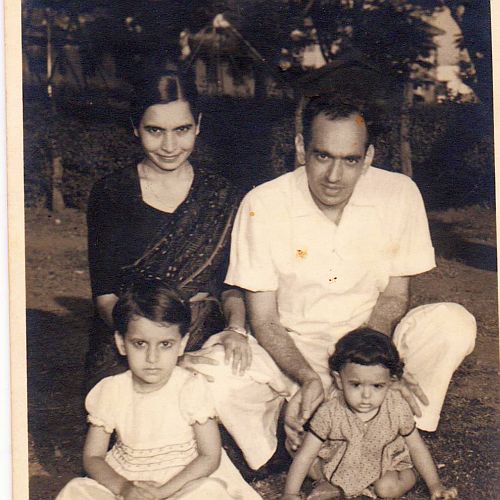
My sister, Santosh, with her husband Sikandar. And daughters, Anuradha (left), Ritu (right). 1958
After couple of months, the situation changed.
One of my office colleagues, Kareer, who lived in a big apartment in a building called Sangham, right opposite the Strand Cinema, Colaba - hardly a few minutes' walk from the office - offered to share his flat with us at a very nominal charge!
Kareer was staying in the flat with his British wife, who after living with him in Bombay, decided to leave him and go back to London. Poor chap. Tough luck. But lucky for both of us. My wife and I moved into the Sangham building with him. We were quite happy, and somehow managed to live nicely on my small income.
Time passed. Then goddess luck struck again.
This time Kareer's wife, the British lady, decided to come back to India and re-join him. Perhaps her situation in London was worse than Bombay!
So, we were asked to find some alternative place in a month's time before her arrival. It was now impossible to go back to my sister and her husband, who were moving out to another city. Nor could we get a roof on our head on our own with my income.
The prospects of finding another job with a bigger salary were not very bright. And asking our parents for financial help was out of question. In fact, we had no face to show them and tell them the truth. However, sometimes a hopeless situation makes one think out daring and bold antidotes. Without worrying about the consequences.
Our solution - go to London
Our answer to our hopeless condition was to leave India and go to London - like all unemployed young men of that period. Hoping to build career and wealth.
Since I had now got involved with advertising, I decided to follow it up. I started writing to some of the advertising agencies in London for a job. The idea was to get a job, and then join the evening classes, which were being run by the Institute of Advertising Agencies, London. But none of the people I wrote to ever replied. However, by now, we had made up our mind to leave and go to London-job or no job.
We had paid and booked our passage from Cochin to Genova by an Italian liner, Lloyd Tristino. And by train from there to London.
So we packed up our stuff, left my job. We left Bombay for Cochin to catch the boat. We did not meet our families. We just informed them of our plan.
It took us two days by train to reach Cochin from Bombay. We reached Cochin two days before the sailing. Here we stayed with one Mr. Prasher, a Naval Officer, who showed us the whole city, and took us to his ship, INS Mysore. That memorable two-day stay that relieved lot of tensions at leaving Bombay.
We left India on 19th September 1958 (see the Passports).
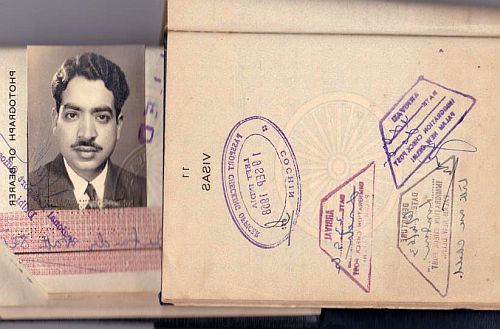
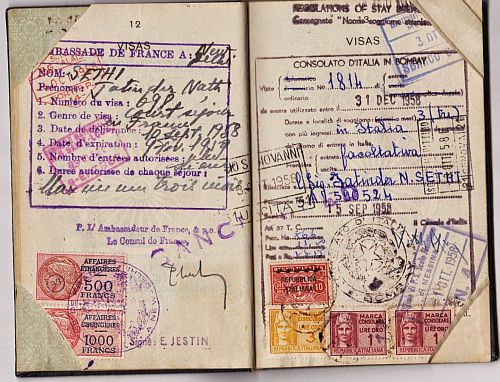
Passport Jatinder Sethi, showing departure date 1958 and various visas
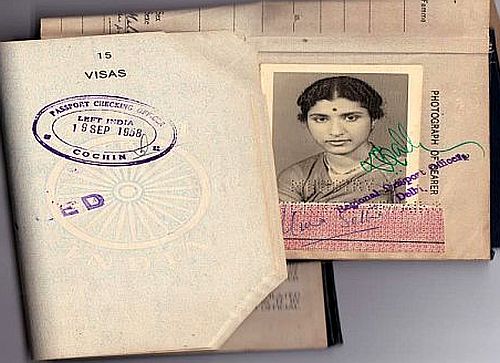
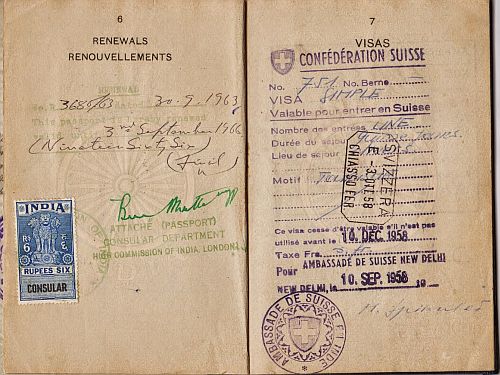
Passport Uma Sethi, showing departure date 1958 and Swiss visa
We had about £ 50 between us, after paying all expenses for train to Cochin, and further travel to London. Plus, our travel agent had told us that he would send an additional £ 30.
Go to Part 2 (not yet ready).
_______________________________________
© Jatinder Sethi 2014
Comments
Add new comment